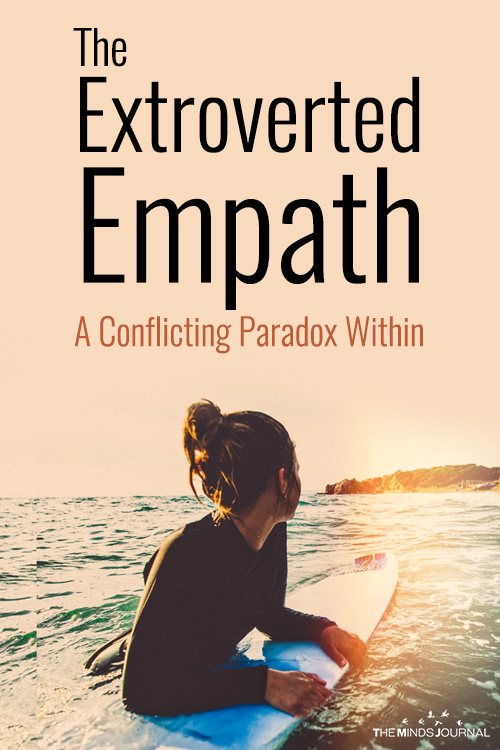The image of an Empath is very clear in the minds of most of us. We all know that empaths are the best and the kindest of people who cannot see anyone else in pain or trouble. But what about an extroverted empath? How do they fit in, in this world?
But let us begin by looking at the characteristics of Empaths (for those of us who aren’t fully aware of the nuances of the term):
• Empaths are filled with overwhelming empathy for people around them.
• They are the eternal givers.
• They are very intuitive and they always know how to make someone feel better.
• They are hypersensitive to everything that happens around them.
• They are super good at discerning emotions and feelings of people around them.
• They love their alone time as it helps them regenerate their own selves.
• They are beautiful from the inside but often lead very lonely and sad lives.
Most people will tell you that empaths are introverts. They love being with themselves and spending time alone. This may not be fully true. We will tell you more about the paradox of being an extrovert and an empath AKA, extroverted empath.
Yes, shocked?
Related: 13 Traits Of A Real Empath
Extroverted empaths do exist, and they often go through the following problems:
• They desire human connection because they are extroverts but because they are empaths, the more they interact the more they drain themselves.
• Due to their extrovert nature, they can understand the feelings of a lot of people simultaneously. But they are empaths as well and so they know the intricate details of many people at the same time.
• They are extroverts so they love to know about the experiences of other people but this isn’t on a superficial level. They want to know about other people on a deeper level because they are empaths as well.
• People think that they are extroverts so they don’t need much time alone. But because they are empaths they want to be alone sometimes.
So, how to help yourself when you are an extroverted empath? Because it is obvious that this tension can tire you and drain your energy, strength, and courage.
Here Are 5 Ways You Can Deal If You Are Extroverted Empath
1. Involve yourself in breathing practices.
Breathing practices familiarize us with our own selves. We become more aware of our senses, our feelings, our body, and the energy that we have. Moreover, they help you maintain some sort of emotional balance which is surely important in life.
For an extroverted empath, breathing practices are crucial so that they can strike a balance in their lives and thus lead a more fulfilling life.
2. Don’t keep any emotion that doesn’t belong to you.
The more you engage with people, the more you absorb their energy. For an empath, it is easy because they engage with fewer people but for the extroverted empath, this is very tough because the engagement is with so many people and all of them are different in their own ways and they come with different sorts of energies.
So, it is absolutely pertinent that the extroverted empath looks into themselves and tries this simple exercise: let go of any feeling or emotion that does not belong to you. Keep in your heart only which is yours. This way we will not only release the emotion or feeling that is pulling us down but will also release the bad energy that comes along with that feeling.
3. Ground yourself and make yourself the center of the world.
As an extroverted empath, you come in contact with the energies of a lot of people and that is bound to bring you down and affect you.
This is why you need to ground yourself and re-center your energy on yourself. Grounding means that we become more aware of the connection that we have with the Universe. Centering means that all the emotions and all the energy that we have sent to the universe must find its way back to us; so it is a process of making yourself the center.
Related: How To Fully Release Difficult Emotions That Hold You Back
4. Sometimes, relax.
In order to replenish themselves, empaths need to take a break. As mentioned earlier, all the excess emotion might take a toll on you and therefore it is important for you to spend some time alone.
But for the extroverted empath, life is harder. It is even more full of emotions and stress because of the huge social circle that an extroverted empath has. This can also be solved using the tool of breaks.
Take breaks and spend time with yourself. You can also spend time in nature or do a favorite activity. Also, you can indulge in your hobbies while taking these breaks. Breaks will not only fortify you but they will also help you to help the world in a better way. Thus, sometimes be selfish and take breaks.
5. Learn to be alone in company.
Learn to be alone even when there are people around you. Empaths attract a lot of people. But the extroverted empath attracts even more people.
So, probably you might not find that much time alone. The only solution to this is that you must learn to be alone while you are around people. Also, you should learn to carve out some alone time, just for yourself.
You deserve it, after all, you help so many people. Use your alone time wisely and judiciously and you will find yourself fuller and happier.
It may seem very hard to be an extroverted empath but if you are one, don’t fear. You must have so much courage inside of you already which is why you are able to deal with so many emotions and feelings simultaneously.
Just continue on this path of goodness and on the other side is just peace and happiness. You will not even know how many people you will be able to help because being an extroverted empath is actually a huge blessing.
You are lucky that you got both the qualities of an empath and an extrovert in you. Use them and make this world a better place to live in.
Love and Light!
The Minds Journal Articles Volume -1 is Copyright Protected vide Regd.# L-103222/2021















Leave a Reply
You must be logged in to post a comment.